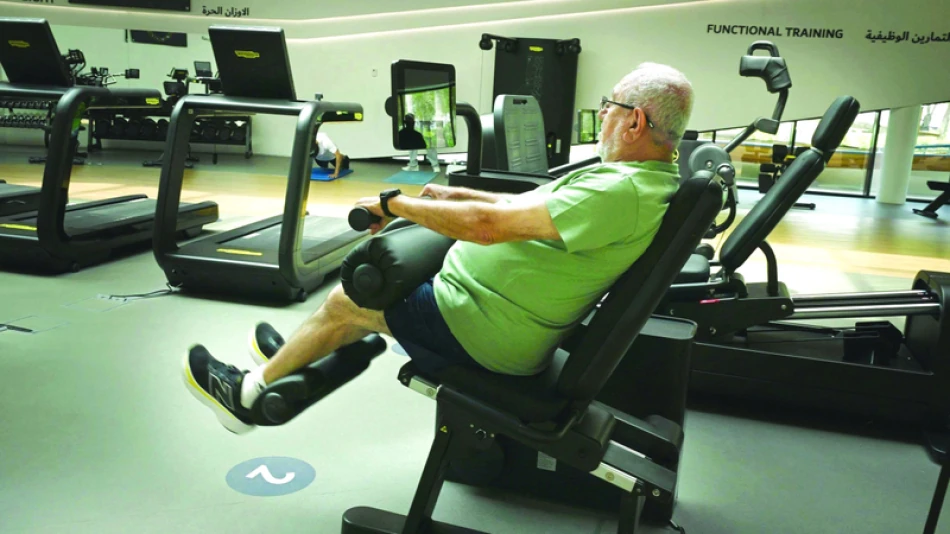
Exciting New 'Thachar' Club Opening Soon in Al-Khawaneej; 3 More Locations Under Consideration
Dubai's "Zakher" Club Redefines Retirement with Active Aging Model for Over 1,300 Members
Dubai is pioneering a revolutionary approach to retirement through its "Zakher" club, which has attracted more than 1,366 members—including some over 90 years old—since launching as part of Sheikh Mohammed bin Rashid Al Maktoum's Dubai Social Agenda 33 in early 2024. The initiative challenges traditional retirement concepts by positioning post-career life as an extension of productivity rather than withdrawal from society.
Rapid Growth Signals Strong Demand for Active Aging
Dr. Ali Sinjal, Dubai Police's health advisor and Zakher project leader, revealed that membership has surged to 1,366 people, with 780 men and 586 women participating. The club operates with an hourly capacity of 30-50 members and maintains an active membership base of approximately 300 individuals.
This growth trajectory reflects a broader global trend toward active aging programs, similar to initiatives in Singapore's successful aging-in-place policies and Japan's "silver human resources" programs. However, Dubai's model uniquely emphasizes national responsibility over consumer privileges, distinguishing it from purely recreational senior centers found elsewhere.
Ambitious Expansion Plans Target Community Integration
Geographic Growth Strategy
The program plans to open a second location in Al Khawaneej next month, with three additional areas under consideration. More significantly, Zakher aims to extend beyond traditional club boundaries into residential neighborhoods and institutions, potentially creating a distributed network that could serve as a model for other emirates.
This expansion strategy mirrors successful community-based aging programs in Nordic countries, where integrated social services have demonstrated measurable impacts on mental health and social cohesion among older populations.
The "No Retirement from Life" Philosophy
Dual-Axis Development Model
Zakher operates on what Sinjal describes as a "dual-axis model"—vertical integration focusing on mental, psychological, and physical balance, while horizontal integration emphasizes family and community interaction. This holistic approach uses precision equipment to measure cognitive, psychological, and health performance indicators.
The philosophy directly challenges the traditional Gulf region's approach to aging, where extended family networks historically provided primary support. By institutionalizing active aging while preserving cultural values, Dubai positions itself ahead of regional demographic challenges that will intensify as oil economies diversify.
Economic and Social Impact Beyond Recreation
Measurable Outcomes
Club member Mohammed Abdullah Jasim exemplifies the program's impact, crediting Zakher with transforming his lifestyle, enhancing his health, and providing opportunities for intergenerational knowledge transfer. Notably, several members have launched new businesses or returned to the workforce, suggesting economic benefits beyond social engagement.
This outcome aligns with research from the OECD showing that active aging programs can reduce healthcare costs by 15-20% while increasing tax revenue through continued economic participation by older adults.
Strategic Positioning for UAE's Demographic Future
Located in Dubai's Safa Park, Zakher represents more than a social program—it's a policy experiment addressing the UAE's approaching demographic transition. As the country's expatriate-heavy population ages and Emirati citizens live longer, programs like Zakher could become essential infrastructure rather than optional amenities.
The initiative's emphasis on preserving national identity while embracing modernity reflects Dubai's broader strategy of cultural preservation amid rapid globalization. By positioning retirees as active contributors to national identity rather than passive beneficiaries, the program could influence regional approaches to aging populations.
Implications for Regional Development Models
Zakher's integration under the Higher Committee for Development and Citizens' Affairs signals government recognition that demographic change requires institutional innovation. Unlike purely market-driven solutions common in Western countries, Dubai's approach combines state coordination with community engagement, potentially offering a "third way" for developing economies facing similar transitions.
The program's success could influence policy development across the Gulf Cooperation Council, where traditional family support systems face pressure from urbanization and changing social structures. Early results suggest that proactive aging policies may prove more cost-effective than reactive healthcare interventions, making Zakher a closely watched experiment in regional governance innovation.
Most Viewed News

 Sara Khaled
Sara Khaled






